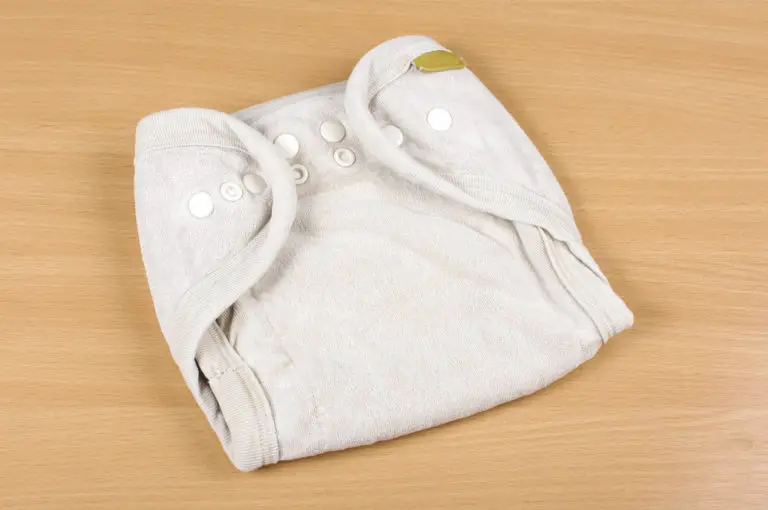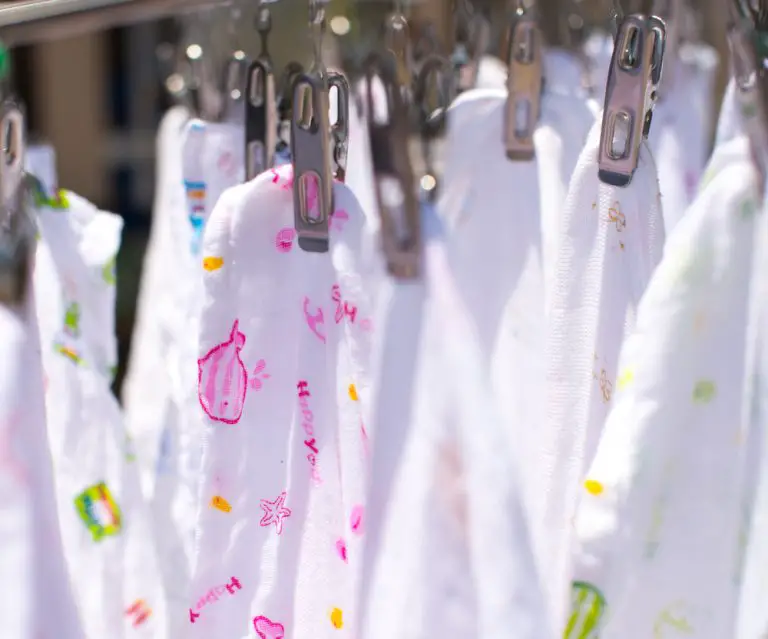How to Wash Cloth Diapers? (Step-by-Step Guide)
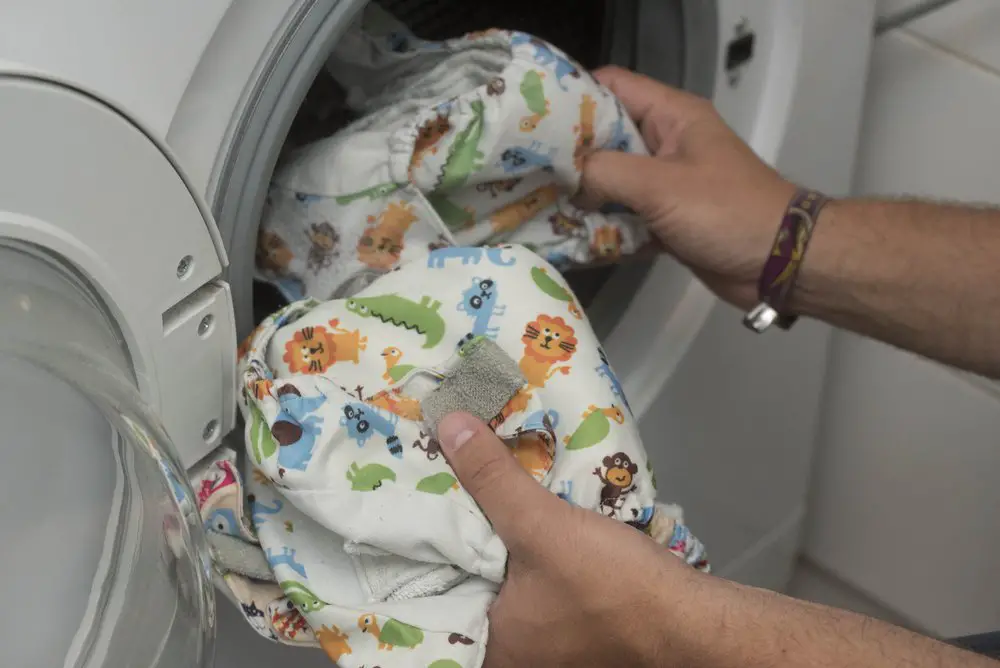
The biggest con with cloth diapers is the constant washing. But, once you know the process, it will become a breeze.
Here’s my simple process on how to wash cloth diapers and what NOT to do.
- Simple Cloth Diaper Washing Process
- What NOT to Do
- How Often Should You Wash Cloth Diapers?
- How to Store Dirty Diapers?
- Essential Hygiene Products for Cloth Diapers
Simple Cloth Diaper Washing Process
To clean a cloth diaper, remember this rinse, wash, rinse. Here is a simple cloth diaper wash routine: pre-wash the diapers on a cold wash with no detergent. Next, wash on hot using a detergent for cloth diapers and let them go through a final rinse cycle.
1. Remove Any Solid Material
Whether your baby is breastfed, formula-fed, or a combo of both, they will have dirty diapers, and nobody wants to have poop in the washing machine!
Breastfed babies have water-soluble poop, so a special cloth diaper cleaner isn’t needed; you can toss these in the diaper pail until it is time to wash. Formula-fed babies and babies who eat solids will need a couple of extra steps to keep cloth diapers clean.
To make washing cloth diapers soiled with poop easier, consider using a cloth diaper liner. Liners provide an extra layer of protection between the poop and the diaper. Remove the dirty liner and toss.
I used liners and loved them! If you don’t use a liner, scrape any poop you can into the toilet and flush. Some parents use a water sprayer attached to their toilet to help spray down the waste.
2. Check the Recommended Washing Guideline
You should always check the recommended washing guidelines provided by the manufacturer. Start by checking the diaper packaging or the manufacturer’s website for special tips.
The manufacturer may recommend specific cloth diaper laundry detergent or methods of drying cloth diapers. Failing to follow recommendations means you could lose out on any warranties or lifetime guarantees the company offers.
Cloth diaper care requires special washing and drying; they cannot be tossed in with your regular laundry. To care for cloth diapers and increase their life cycle, follow proper cloth diaper cleaning procedures, and your diapers will last you through more than one baby!
3. Run a Rinse Cycle
Running your cloth diapers through an initial rinse cycle on cold water is essential to prevent stains. Use the pre-rinse or speed-wash cycle but do not use any detergent with the initial rinse.
Some people swear that using a small amount of OxiClean is an essential step in the cloth diapers wash routine, so go for it if you think it will help, I did, and my diapers always looked and smelled clean!
After the initial rinse, separate the diapers and inserts if using pocket diapers. The first rinse is to loosen up any gunk or muck before running the actual diaper wash.
4. Run a Hot Washing Cycle
A hot wash is essential to clean cloth diapers. You must also investigate laundry detergents for cloth diapers.
You may even want to consider an additional smaller diaper washer or hand-crank diaper machine to clean cloth diapers with poop if the idea of cleaning your clothes and diapers in the same machine is bothersome.
Set your machine to hot wash and include an extra rinse at the end. Use a scent and color-free detergent. There is no need to use fabric softeners or any laundry additives as hot water is best, plus doing so could create unnecessary build-up on the diapers.
If you have hard water, you may need to add a bit more detergent to get your cloth diapers clean; this is because hard water can make your detergent less effective, which will make your diapers less effective.
5. Run a Second RInse Cycle Without Detergent
The final step in cleaning cloth diapers (before you dry) is running a final rinse cycle with hot water.
This final rinse should be done without any cloth cleaner, although some people opt to use ⅓ baking soda now and then as it helps rid the diapers of any detergent build-up that could lead to leaky diapers.
After running the rinse cycle, give one a “sniff test” to ensure you have a clean diaper.
If the diaper has a soiled odor, they are not clean and require another hot water rinse cycle. Your baby’s diaper should smell fresh and clean before you are ready to dry.
6. Air-dry the Diapers
Check with your diaper company’s guidelines for the best method of drying. Some are OK to go into the dryer others must be air-dried.
Even if your diapers can go in the dryer, drying them outside in the fresh air and sunshine is the best way to go! Not only does fresh air make them smell good, but the sun is a natural bacteria fighter meaning it can sanitize cloth diapers while they dry!
If you do not have access to an outdoor line, consider hanging a line in your home or bathroom. Air-drying provides less wear and tear than continuous cycles in the dryer, even if it takes longer.
What NOT to Do
Here are a few things learned the hard way: do not wait for more than a day or two to wash your dirty diapers as stains and odors will set in.
If you take your cloth diapers on errands – DO NOT forget about a soiled diaper in your diaper bag, or you will regret it and may ultimately have to throw it away. Here are the main tips you need to know!
Avoid Softeners if Possible
Fabric softeners and dryer sheets tend to contain chemicals and fragrances (1) that may not play nicely with your cloth diapers or your baby’s bottom.
If you use fabric softeners, you will be creating more work for yourself when it is time to wash diapers because it may take extra rinse cycles to rid the cloth of the excess residue.
The residues left behind by fabric softeners make the cloth diaper less water-resistant, which may lead to leaky diapers and messes for you and your baby (2).
If you opt to air dry in the sunshine, you shouldn’t need to use dryer sheets as the fresh air will give your diapers a clean, fresh scent!
Wash No More than 12-18 Large Diapers at a Time
Cloth diapers need room to move and agitate in the washer to get appropriately clean; overstuffing your washer means your diapers may take more cycles to get clean or may not get thoroughly cleaned at all.
Since a newborn can go through more than ten diapers a day, it is recommended you have at least a two to three-day supply or roughly 24-36 cloth diapers.
Even the most dedicated cloth diaper user will not be able to wash diapers every day with a newborn around, so set yourself up for success and some breathing room by having plenty of clean supplies available!
Avoid Chlorine Bleach
We’ve been trained that bleach kills germs, and it’s true, it does, but using chlorine bleach on your cloth diapers regularly will break down the fibers and shorten their lifespan.
Not to mention, bleach can be harsh and irritating to a baby’s delicate skin. Check with your brand’s recommendations for using bleach, as some may say it is ok once in a while.
Some people opt to use vinegar, a natural disinfectant, in place of bleach, but again use caution as the scent of vinegar is strong. It is essential to note you should never mix vinegar and bleach together as it creates a toxic gas.
How Often Should You Wash Cloth Diapers?
You should be washing your cloth diapers every one to two days. I recommend that three days is the absolute longest you can go. After two or three days, according to most cloth diaper sites and articles, you start risking mildew (3), which occurs when clothing is kept in damp conditions.
This will require extra washing and rinsing to get rid of. In general, you should try to wash one load a day when possible. It can help to set a timer or reminder on your phone or to make it a scheduled part of the day. For example, every day, when the baby takes their midmorning nap, you wash diapers.
While stocking up on cloth diapers can be costly initially, the overall cost of not buying a box of diapers each week will win out in the end, mainly if you chose to use cloth diapers 100% of the time. Some people opt to use disposables while running errands or when visiting others for convenience.
Remember that many childcare centers will not allow you to use cloth diapers, so if your child will eventually be attending a center, you may want to consider the overall cost. I chose to continue using cloth diapers at home and sent disposables to childcare until my child grew out of his cloth diapers.
How to Store Dirty Diapers?
Dirty diapers smell, no surprises there, so how do you store them until washing time without making your entire home reek?
The good news is that since cloth diapers have made a resurgence in recent decades, many containers are designed specifically for them.
I used a specially designed washable and odor-resistant liner in a hands-free trash can that I tossed in the wash with the diapers. There are all types of washable liners that can be placed in laundry bins, but a bin with a lid is recommended to help contain the smell.
It is also important to cleanse a poopy diaper as much as possible before placing it in the bin and to make it damp; this method makes it easier to wash.
When you are on the go, keep small plastic bags with you to securely wrap any soiled diapers in until you get home. You can also use wet bags which are designed to keep the yuck inside.
Essential Hygiene Products for Cloth Diapers
Washing and drying cloth diapers correctly are the number one things you can do to keep your diapers hygienic and in good condition, but there are some other great products that can help and make it even more convenient to use them!
Laundry Detergent
Using a biodegradable, eco-friendly, powdered laundry detergent is the way to go when cleaning your cloth diapers!
You need a strong enough product to remove those poopy stains but gentle enough that it won’t irritate your baby’s bottom. You want a detergent that is safe for all washer types and that uses cloth diaper-safe enzymes.
Diaper Sprayer
A diaper sprayer can be a lifesaver when it comes to rinsing away all the poopy mess your baby deposits in their diaper.
Attaching a bidet-style sprayer to your toilet can save you a lot of time and hassle. A high-powered sprayer can rinse away all the poop without you having to partake in the dirty toilet dunk.
Diaper Bag
A waterproof diaper bag will be your best friend, especially when you are out on the go. Purchase a bag that has two separate compartments so you can keep clean items away from soiled items.
A sturdy, zip-top closure is ideal, as well as a bag with a strop so that you can link it around your wrist or attach it to a stroller.
Diaper Liner
Using disposable and biodegradable diaper liners is environmentally friendly and can prolong the life of your cloth diaper.
Diaper liners help prevent your cloth diapers from stubborn stains and save on clean-up since you can toss them and poop away like you would a traditional diaper.
However, unlike diapers, biodegradable liners don’t clutter up landfills or leak chemicals and plastics into the water and soil.
FAQ
What is the best way to wash cloth diapers?
Cold rinse, hot wash with cloth diaper-safe detergent, second hot rinse (possibly a third), and air dry outside in the sunshine if possible.
Do you really save money using cloth diapers?
Yes! The average baby uses 2,200 diapers in their first year, costing roughly $770 annually before factoring in disposable can liners, another $300—three years of disposables equal about $3,200. Cloth diapers, even the most costly, have a lifetime cost of under $800.
Do cloth diapers ruin your washing machine?
No, they won’t; the key is to use a detergent that’s safe for your machine style and not overload your washer, which can offset the washer-barrel.
Can you dry cloth diapers in the dryer?
Check with the manufacturer. Some brands may say it is ok to dry them on low or medium heat, but air drying is always the best choice when an option.
How do you get the poop out of cloth diapers?
Use a spray attachment connected to your toilet, disposable diaper liners, or a scraping device. You can also swipe soiled diapers in the toilet to loosen any poop.
What do you soak cloth diapers in?
If soaking diapers using the wet pail method, use cold water to soak your baby’s diapers. You can add some baking soda to the water as some believe it cut down on the stains and odor.
Are cloth diaper services sanitary?
Using a cloth diaper cleaning service is a sanitary option because they must follow health and cleaning regulations. They will also sanitize your diapers, so a cloth diaper service is an excellent choice if you have the extra cash.
Where do you put dirty cloth diapers?
Dirty cloth diapers should be placed in a laundry or diaper pail specific to cloth diaper use. You can use washable liners for at-home use and waterproof plastic bags when you are on the go.

L. Elizabeth Forry
L. Elizabeth Forry is an Early Childhood Educator with fifteen years of classroom teaching experience. She earned a Master of Science in Early Childhood Education from The University of North Dakota and has a Bachelor of Arts in English and one in Music from Lebanon Valley College. She has taught children in Japan, Washington D.C., Chicago, and suburban Maryland. She is trained as a reading therapist, has a TEFL certification, and has done extensive work with children regarding mental health, social-emotional development, and gender development. She has written curriculum for children and educators and has led training sessions for parents and educators on various topics on early childhood development. She is the mother of two boys and resides outside of Annapolis, Maryland.

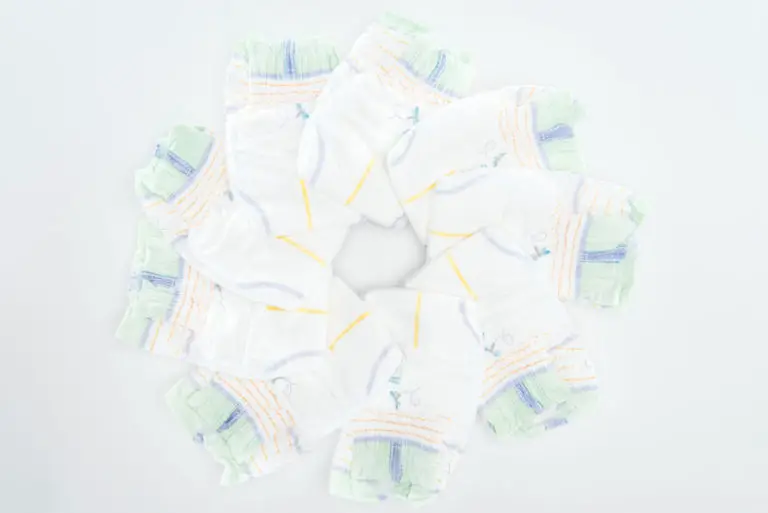
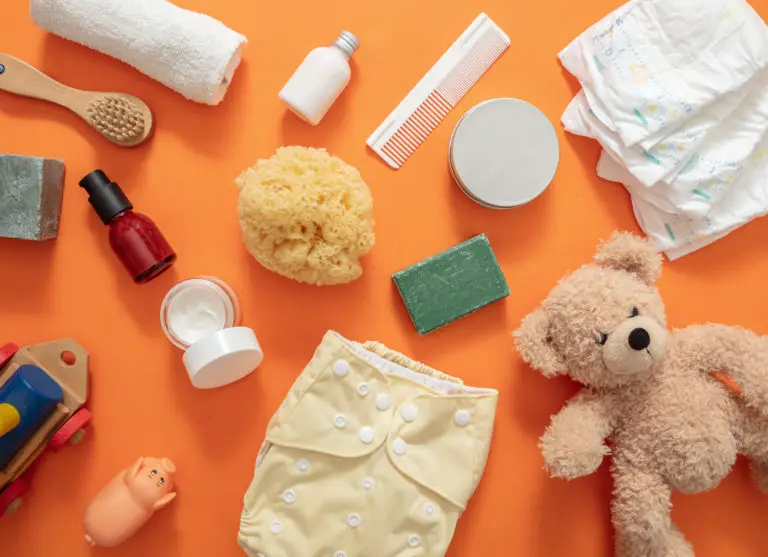
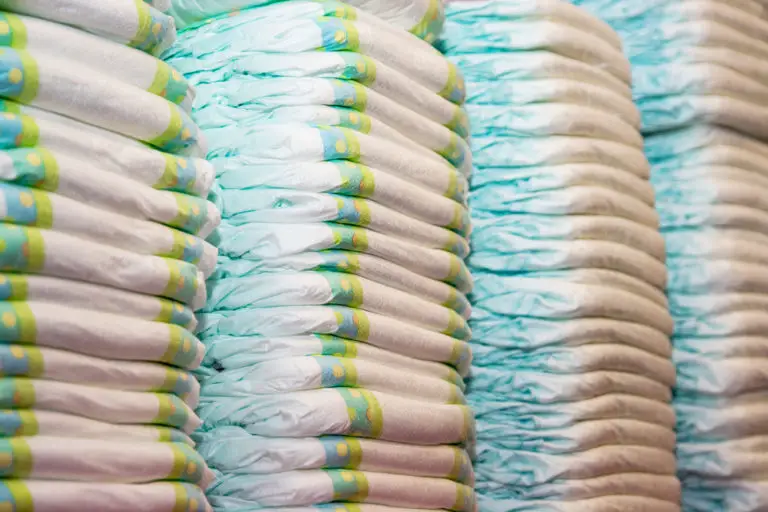
![10 Best Biodegradable Diapers [Chemical-Free and Safe]](https://parentingmode.com/wp-content/uploads/2022/06/Depositphotos_27923761_S-768x512.jpg)
